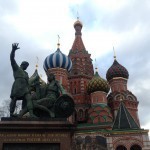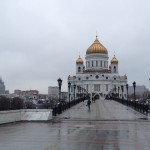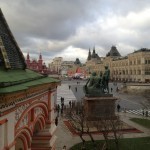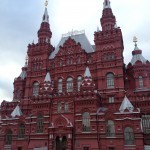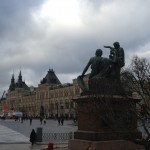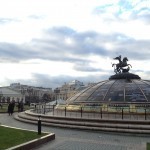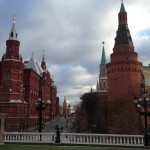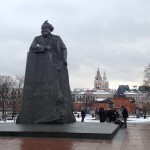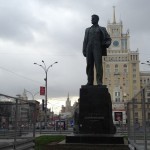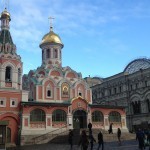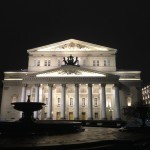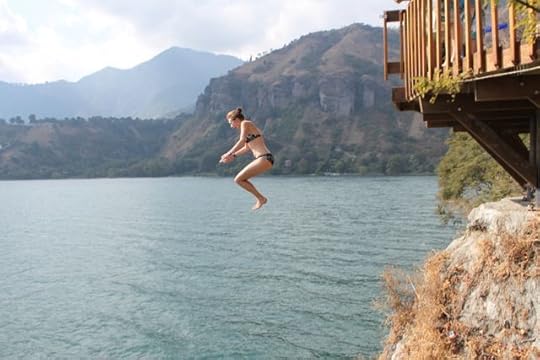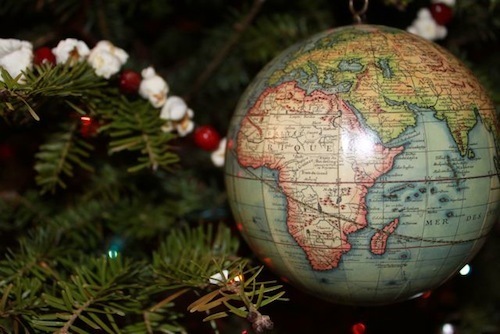Rolf Potts's Blog, page 72
December 27, 2012
Pros and Cons of being a New Nomadic Rich
Vagablogging :: Rolf Potts Vagabonding Blog
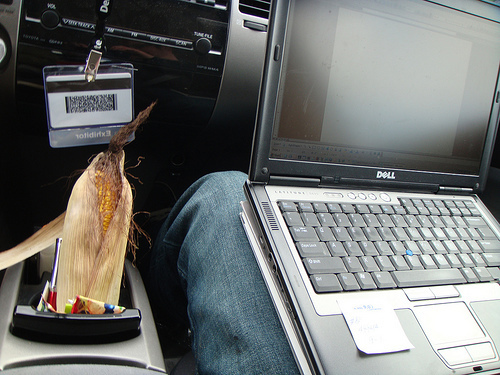
picture credit: Flickr/theregeneration
As my last Vagabonding contribution for year 2012 – and I am glad to say that it has been a great pleasure and a serious commitment, guys – I decided to comment on an interesting article I found here. The author, classifying himself as one of the “New Rich” theorized by Timothy Ferriss’ famous bestseller, gives the life perspective’s lowdown on his profitable work experience as he travels the world. His final view, however, is far from casting an idyllic image of this lifestyle, as he says “it occurs to me that the New Rich, for all of our impressive values, are just as guilty of materialism as the old rich. It just takes a different form. Instead of an addiction to status and possessions, we’re addicted to experience and novelty. The end result is the same. Our relationships, our connections to what’s important, suffer. For the first time in three years of non-stop travel, I wish for a home.”
After reading, the natural question I have is: has the whole “digital nomad” concept of life finally exposed its own limits and faults? Isn’t it, ultimately, just another more solitary way to do business? I can only see that, in the end, a digital worker is STILL bound to his own work schedule and internet connection necessities, after all… with the aggravated understanding of his own group’s isolation. Apparently, the New Rich have reached a level where relationships, life, and possibly the same essence of travel and adventure, radiate from a computer screen. The work location really does not matter anymore: lives keep being conducted behind the comfort and isolation of internet connections and LCD screens, exploiting a code of honor in which relationships may be just taken as an umpteenth source of data – and therefore , become easily negotiable online. In my opinion, the uneasiness expressed by the author is understandable for a long-term traveler; regardless, it casts big, dark shadows on the psychological well-being of online traveling businessmen, at least under a relational point of view, as outlined in the article.
In my own long-term traveler sense, being a New Rich looks exactly like 走马看花 (zou ma kan hua), or “to watch flowers while riding on horseback”: what can be the depth of perception of someone who only experiences places in between computer stints? I am glad that someone from the group finally outlined that “digital nomads” have lost their connection… with reality. Maybe, and pardon the biased pun, if they lost their internet connections, instead, the horrible consequences may help them regain a sense of the exceptional life stories they are living… but can we/they stop thinking of profit and money as we/they travel, at least for a short while? I would like to read your opinions/experiences.
Original article can be found here: Pros and Cons of being a New Nomadic Rich
December 26, 2012
Suffer from food allergies, there’s an app for that
Vagablogging :: Rolf Potts Vagabonding Blog
Engineers at UCLA are working on converting an iPhone into a small laboratory. Weighting less than 2 ounces, the iTube attaches to your phone and analyzes a food sample in about 20 minutes using a colorimetric assay test. The user grinds up a small sample of food with hot water and places it in the tube along with an extraction solvent. After several other testing liquids are added; the phone then captures an image of the sample using its built-in camera and a program app optically analyzes the image for allergen particles down to parts per million. It doesn’t just confirm the presence or absence of peanuts, almonds, hazelnuts, eggs or gluten; it also tells the amount within the sample.

image courtesy of: UCLA Newsroom
As someone who suffers from severe food allergies; the possibility of such a gadget intrigues me. However I am still skeptical. When in doubt about the specific ingredients of a food, I simply opt not to eat it. True, this practice limits my culinary variety but I figure I can find thrills other ways.
How about you? If you suffer from food allergies would you consider the iTube a useful gadget for home or travel use?
Original article can be found here: Suffer from food allergies, there’s an app for that
December 25, 2012
Vagabonding Field Report: Who said Russia in the winter was a bad idea?
Vagablogging :: Rolf Potts Vagabonding Blog
Cost/day: $60/day
What’s the strangest thing you’ve seen lately?
The massive amounts of Soviet-era and communist monuments were the strangest. As an American and son of Polish revolutionary parents who were involved in overthrowing the communist government in Poland, it was very interesting to see such communist icons be idolized and celebrated. Most places don’t exactly have Karl Marx statues these days.
Describe a typical day:
I walked and took the subway around town to see all the sites, such as the Kremlin, Red Square, Gulag Museum, St. Basil’s Cathedral, Bolshoy Theatre and several others. I tried to walk as much as possible so that I could see all the interesting side streets along the way, but the massive subway system in Moscow was definitely worth experiencing. I met a local entrepreneur for drinks in the evening and learned about living and working in Moscow.
Describe an interesting conversation you had with a local:
I met a local entrepreneur who was trying to get a start-up off the ground in Moscow, but was struggling with the bureaucracy and oligarch structure. He told me many of his stories and challenges trying to rise up in a country with such an economic divide where you are either well connected – or you are not.
What do you like about where you are? Dislike?
I disliked how cold everyone was in public. They were almost never willing to strike up a conversation or help you out. However, when you spent some time and had a drink with someone, I noticed that this completely changed – Russians are actually very friendly and hospitable once you get beneath their tough surface. That was the part I liked best.
Describe a challenge you faced:
I was walking all around Moscow and it was very cold and icy. It warmed up just enough to turn the snow and ice into slush, which made my socks and shoes soaking wet and cold. I just took off my socks and kept trucking along!
What new lesson did you learn?
I was taught that there are only two types of people who smile in Russia – tourists and morons. I am not sure if this speaks for everyone, but I thought it was funny and consistent with my limited experience!
Where next?
Panama and Costa Rica – I need some warm weather!
Follow me on my blog, Facebook or Twitter!
Original article can be found here: Vagabonding Field Report: Who said Russia in the winter was a bad idea?
Do you need a sanity check? The 90% rule.
Vagablogging :: Rolf Potts Vagabonding Blog
Christmas this year find us on the edge of the jungle in Borneo. Hiking yesterday I found a pocketful of nutmeg and remembered making a Christmas phone call years ago, with my brother who was here in the Spice Islands while I was “at home” changing diapers. He told me about the orang utan he’d encountered deep up a jungle river and he mailed me a boxful of nutmeg he’d picked off of the forest floor for me. This year I’ll be making that phone call home, and he’s the one ankle deep in babies and diapers.
Josh spent the first five years after university in a 34 foot sailboat, circumnavigating. He was named after Joshua Slocum, so it was his fate. He and I have both chosen unconventional lives, as a direct result of our unconventional upbringing. We were raised to follow our dreams, instead of toe the line. I’m unspeakably grateful for that.
I remember a few short weeks before we leapt off the cliff, quit the high power job, sold our house out from under our four young children and struck out in the world with what we could carry on our bikes and nothing more, talking with him on the phone from his little homestead in the Okisollo channel in BC, where he builds boats and plots adventures. We’d been getting a little push back from people in the conventional world, people who were concerned that we were committing financial suicide, limiting our children’s educational or social potential and who were a bit incredulous that we’d step out of a “perfect life” for something so uncomfortable, so uncertain, as full time travel.
“We’re just getting a little hate mail, and it’s making me wonder… is this going to turn out to be a big mistake? I mean, it’s different with four kids, isn’t it?”
Josh chuckled, in his quiet way, and replied:
“And these people sending hate mail, what, exactly have they done? Do they have any experience with this kind of thing?”
I had to admit that they did not. None of them had done anything out of the status quo.
“See, to my mind, that’s exactly where you want to be. When 90% of the people who haven’t done anything think you’re nuts, that’s just about right. It’s when the 10% of people who have done what you want to start raising red flags, then you might want to listen.”
I laughed with him and breathed a sigh of relief; of course he was exactly right.
Over the years, I’ve repeated that bit of wisdom to many other folks on the cusp of something huge and frightening and life changing. It’s proven itself true in our own lives, time and again. If you want to live a passion driven life and your passions are taking you outside of the status quo, don’t look to the folks living conventional lives for the encouragement or experience you need. You’ll need to surround yourself with other dreamers of big dreams, and you’ll need to create a community of folks who are living in the world you’re trying to create as a sounding board and sanity check.
Original article can be found here: Do you need a sanity check? The 90% rule.
December 24, 2012
Pep talk: 71 travel experts on why seeing the world can be a reality, not just a dream
Vagablogging :: Rolf Potts Vagabonding Blog

Drill sergeant speaking to new recruits
Travis at the frequent flyer blog Extra Pack of Peanuts assembled a Who’s Who of bloggers in this epic round-up post: What’s your excuse for not traveling? 71 travel experts tell you why it’s bull**t.
A pattern quickly emerges in the responses: the No. 1 issue is money. Over and over again, the bloggers say that the main reason they hear is that people don’t have enough money. Several delved deeper, saying that these people did indeed have money–they just weren’t prioritizing travel. With companies reporting profits, it’s clear that there is money being spent, but not on seeing the world.
Even when told about how to cut expenses with frequent flyer miles, couchsurfing, “goodwill guides” who give free tours, some people still stubbornly believe that travel is outside their reality.
Could it be because travel isn’t “consumable,” like other things you can buy? It’s not something you can just turn on and enjoy. Travel requires conscious living: saving money, taking time off work (or quitting), finding someone to take care of your kids if you have them, booking flights and accommodation, and the list goes on. All this has to be done before even setting foot at your destination. Instead of taking something home, you have to push yourself out into the world. This can seem inconvenient at best or downright frightening at worst for someone who hasn’t done it before.
Do you have friends, family and other people in your life who don’t “get” travel? Please share your experiences in the comments.
Original article can be found here: Pep talk: 71 travel experts on why seeing the world can be a reality, not just a dream
December 23, 2012
Tourism retains some metaphysical connotations of pilgrimage
Vagablogging :: Rolf Potts Vagabonding Blog
“Could there be something of the sacred left in the tourist’s experience today? As well as the similarities in scale, modern-day mass tourism maintains some of the metaphysical connotations of the pilgrimage. After all one does not actually purchase anything physical when planning a trip, rather its a means by which we can acquire experiences. Thus the sheer intangibility of the modern-day holiday (and one should not forget the religious provenance of this word) hearkens back to its spiritual predecessor. Similarly while a secular world may allow tourists to create their own holy places, sanctified by natural beauty, good weather or physical challenges, the idea that one returns from sacred journeys with a changed perspective is still implicitly the case. Tourists, like pilgrims, seek recreation in the fullest sense of the word.”
–George Pendle, “Sight Seers,” Bidoun, Spring/Summer 2006
Original article can be found here: Tourism retains some metaphysical connotations of pilgrimage
December 21, 2012
Giving the Gift of Travel
Vagablogging :: Rolf Potts Vagabonding Blog
We’ve all been there. Receiving a holiday present that we didn’t really want or need. Something that will inevitably take up space in the closet or on a shelf, destined to collect dust until we throw it out. I’ll bet most of us have also been on the other end of the transaction, buying an object that we think a person might like or want in order to have something to give them. One that will most likely spend its life in a closet or on a shelf.
We all have better things to do with our money and our time. So consider giving someone something that is truly priceless, a gift in its purest sense, one that will keep yielding new treasures for the rest of your friend’s or loved one’s life: An interest in exploring and learning about the world they live in.
We know the sort of treasure that awaits them, should they have the courage and will to escape their cozy US comfort zone. Long after our travel bills are paid off and the years have yellowed the pages of our travel journals, we recall the magic of our first experience of another culture while overseas. We remember the thrill of connecting to history where it happened. We recall the majesty of the first cathedral we stepped into, as the sun poured through the stained glass and splashed a kaleidoscope of vivid color across the hallowed space. Most of all, we cherish the friendships we made and the lessons we learned.
If some you know has yet to travel overseas, encourage them to do so; share your memories and insights with them. Engage their imaginations by telling a story about your own adventurers. Buy them a travel guide, anything to motivate them or arouse their curiosity. You’ll be giving them a real gift: Spark their interest in seeing a world waiting to be explored and enjoyed. Once that spark is ignited it can illuminate their lives forever.
Original article can be found here: Giving the Gift of Travel
December 20, 2012
Worthwhile suggestions for Vagabonding Christmas gifts
Vagablogging :: Rolf Potts Vagabonding Blog
Whe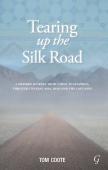 n it is almost time to feel like a dork again in a cold-less, atmosphere-less Malaysian Christmas on the beach, I found some interesting ideas to help other travelers make this day a worthwhile one in terms of gifts. This list gives nine good and fun suggestions to fill up some stockings and make a good impression on your loved ones – of the vagabonding type, of course.
n it is almost time to feel like a dork again in a cold-less, atmosphere-less Malaysian Christmas on the beach, I found some interesting ideas to help other travelers make this day a worthwhile one in terms of gifts. This list gives nine good and fun suggestions to fill up some stockings and make a good impression on your loved ones – of the vagabonding type, of course.
I may add that a few books always make for great gifts. And I would like to recommend a couple that I recently read and loved, and that may make your adventurist friends a bit less grumpy on a travel-less Christmas. The first is “Tearing up the Silk Road: A Modern Journey from China to Istanbul, through Central Asia, Iran and the Caucasus” by Tom Coote, which you can purchase here. Without getting into a full scale review – which will come about soon -, this is a personal travel narrative of an amazing trip across the heart of Asia and through the Middle East and the Caucasus that will make even the most committed armchair traveler want to get out and explore those ancient, mysterious routes. The fact that I recently completed a similar endeavor – and I know what it means – makes this book even more enjoyable and worthwhile. Congratulations to Tom  Coote!
Coote!
As another suggestion, if your friend has a Kindle reader and you think he may like a good Southeast Asian based thriller, you may consider gifting “Dead Sea” by Sam Lopez, that you can find here. This sea thriller based in the Philippines will make all divers out there reconsider their favorite activity at once… definitely recommended for the toughest out there. If the frostbite is keeping you in, locked up closed to a fireplace, this book may transport you to faraway – and dangerous – territories… you have been warned.
And after all, be it a paper shower, a mini scratch-off map or a good book, I wish you and your loved ones a Merry Xmas… with a tip of envy for your snow, if you are having any… here, it is the constant 35 Celsius I have grown to love, but really makes for a different kind of Holiday Season, if you know what I mean.
If you have any other good ideas for last-minute travel-related gifts, please comment below!
Original article can be found here: Worthwhile suggestions for Vagabonding Christmas gifts
December 19, 2012
Vagabonding Field Reports: Peru is much more than Inca ruins
Vagablogging :: Rolf Potts Vagabonding Blog
Cost/day: $15
What’s the strangest thing you’ve seen lately?
Visiting the Huaca del Sol ruins near Trujillo was fascinating and is a great reminder that there is a lot more to Peru than just Inca ruins. Indeed, the Huaca del Sol is around 1500 years old and well predates the Inca ruins which are, relatively, brand new. The Huaca del Sol has some incredible murals. This guy was probably the most fascinating image we captured while we toured around.
Describe a typical day:
Trujillo provides a wealth of ruins to explore, most of them within only a short bus ride away. Most of our days in Trujillo were spent either lounging in the square, walking the town or exploring the various ruins that surround the city.
Describe an interesting conversation you had with a local:
We met Edward in Trujillo. He was visiting Trujillo from Lima. As we were making a day trip out of town, I got to asking him about how his backpack got torn. He told me that he had been mugged in Lima one day and that the would be thieves had torn his backpack by grabbing and yanking on it. He said he had been carrying his backpack “like a local” instead of like a tourist. According to Edward, tourists always wear their backpack in the front and look terrified all the time so he didn’t want to look like a target by carrying his backpack on the front. He mentioned how his father was a police officer and how silly he thought tourists look when they walk around clutching at their backpacks. In the end, it didn’t matter. Local or not, he still got jumped for his bag.
The conversation was a good reminder that thieves don’t exclusively target tourists. I sometimes find fellow travellers have an “us” verses “them” mentality when it comes to street thefts. Edward’s experience is a good reminder that when it comes to crime, travellers aren’t the only target.
What do you like about where you are? Dislike?
Peru is a great place but its main attractions – Machu Picchu being the greatest of them all – are completely overrun with visitors. Visiting places like Trujillo gets you away from the crush of crowds and let you see fantastic ruins. It’s a great reminder that Peru is a lot more than just a collection of Inca ruins.
Peru is a beautiful place but it can be incredibly busy in places like Machu Picchu. Sometimes it can be overwhelming. Hopefully people will start to explore outside of the classic sights and visit some more of the undiscovered sights in Peru and give Machu Picchu a bit of a rest.
Describe a challenge you faced:
To get out to the Huacas del Sol ruines involves grabbing a bus from a roundabout on the outskirts of town. Finding the pickup location wasn’t easy however. Edward, being a “local”, felt the best approach to finding the pickup spot was to simply ask a local for directions. He then proceeded to ask one person after another for directions. Sometimes it seemed like he was asking for directions just for fun and to meet people. The downside was that every time he asked, he was given different and sometimes conflicting directions. In the end, we were able to find it based on the original map we were given at the tourism office in the center of town.
What new lesson did you learn?
Sometimes, asking locals for directions isn’t the best way to navigate. Its a great way to meet people but sometimes doesn’t get you where you want to go.
Where next?
Continuing south to Bolivia.
Original article can be found here: Vagabonding Field Reports: Peru is much more than Inca ruins
December 18, 2012
Christmas and community on the road
Vagablogging :: Rolf Potts Vagabonding Blog
This year we’re celebrating Christmas in Borneo. Last year we were on Cape Cod, in the USA, the year before that, Guatemala, the year before that, Canada, the year before that found us in Tunisia, camped in the cold on the edge of the ocean of sand.
One of the most interesting parts of our journey has been discovering the differences in celebration around the world. In Tunisia, we were the only one’s celebrating Christmas at all. In Guatemala, we enjoyed the processions, broke a pinata, and sewed stockings for 16 people out of local huipile fabric. Sometimes we’re lucky, and family joins us in some far flung place, some years, we are completely alone.
But we aren’t. Not really.
As long term travelers we learned, early on, the value and necessity of creating community as we go. We actively look for other folks who are out of their element and draw them in to celebrate with us. In Tunisia, this was a missionary family for Thanksgiving. In Guatemala, it was a whole houseful of backpackers who slept on our floor, stacked like cord wood, in front of our fireplace. Even when we were cycling for a year, we always carried two extra sets of plates and forks so that we could invite people to share a meal, cooked on our camp stoves, at the drop of a hat.
We have a few family holiday traditions: stockings of some sort are always hung (and filled!) We always read A Christmas Carol aloud. The kids make decorations. We make a few cookies if we have an oven. And, we find people. There have been very few holidays that didn’t include friends or strangers in my life. I was raised by people who took it upon themselves to welcome the world, the sick and poor to the rich and ridiculous, and it’s a deep rooted part of our family culture.
We’ve just arrived in Miri, Malaysia, where we’ll spend Christmas this year. We’re on the hunt for some people to have in to celebrate with us. What are your Christmas traditions on the road? How do you create community wherever you go?
Original article can be found here: Christmas and community on the road
Rolf Potts's Blog
- Rolf Potts's profile
- 323 followers



